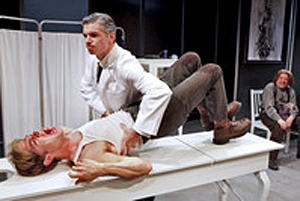Do you have high blood pressure (or does your doctor say you have hypertension)?

Does your doctor raise your blood pressure? U.K. health experts estimate that "white coat syndrome" may account for 25% of high blood pressure cases being misdiagnosed.
Do you dread your visit to the doctor and that moment when you have to remove your jacket or roll up for sleeve for the blood pressure check? (Oh Lord, is it going to be as high as last time? Is he going to insist on a prescription this time?)
If that sounds familiar you may be one of the many who are routinely diagnosed with high blood pressure through readings in the doctor’s office. You could be one of the thousands, maybe even millions, who have been misdiagnosed with the condition…
As a result, you may be prescribed drugs that can damage your health or quality of life simply because seeing your doctor makes you nervous.
In a bold move to eliminate this common mis-treatment, Britain’s National Health Service (NHS) has torn up the guidance sheet on hypertension diagnosis. From now they will require that high blood pressure diagnoses, usually based on office blood pressure readings of 140/90 or above, be confirmed by ambulatory blood pressure monitoring (ABPM) and/or home blood pressure readings carried out by the patient.
The new guidance aims to eliminate or greatly reduce the frequency of misdiagnosis due to a common condition called white coat hypertension. The syndrome occurs when a patient’s blood pressure rises abnormally through natural feelings of stress, nervousness or anxiety aroused by a medical setting.
People with white coat hypertension will have normal blood pressure during routine everyday life; their high blood pressure is confined to the doctor’s office. The potential for error should be obvious, yet the NHS estimates that up to 25% of the 12 million people in the United Kingdom being treated for high blood pressure have been misdiagnosed.
Ambulatory Blood Pressure Monitoring (ABPM): A Better Way To Diagnosis Hypertension…
ABPM is a far more predictable method of diagnosing high blood pressure than isolated office readings as it tracks a person’s blood pressure on a 24-hour, round the clock basis. The subject wears an arm cuff attached to a small digital monitor unit often worn on the belt. The device measures the subject’s blood pressure at preset intervals throughout the day and even while sleeping.

Ambulatory blood pressure monitoring gives a detailed picture of blood pressure around the clock. It is essential for accurate hypertension diagnosis.
The picture that emerges from ABPM is not only useful for diagnosing hypertension but also shows when a person’s blood pressure rises and falls and many other important factors. This can be useful for interpreting how different activities and other factors affect your blood pressure. It can even help to determine the best schedule for taking medications to lower blood pressure.
Self-monitoring of blood pressure in the home can also prove useful to prevent misdiagnosis of hypertension. While not as detailed as ABPM, blood pressure readings in a comfortable home setting tend to prevent white coat syndrome. Simple digital monitors for home use are affordable and reasonably accurate.
Short-term costs for longer-term savings (not to mention better health and peace of mind!)…
The only drawback in all this is that ABPM is much more expensive than the old “pull up your sleeve” routine in the doctor’s office. Medical centers and practices will need to make some up-front investment in devices to ramp up to the kind of supply they will need to provide ABPM to every potential high blood pressure patient.
But the long-term advantages are significant savings through reduced spending on medication and patient follow-up care. The NHS figures the new guidelines will be saving them considerable money within 5 years. If you’re under a private healthcare system or insurance plan that could be money in your pocket.
But the financial savings are nothing compared to savings in the human cost of misdiagnosis. High blood pressure is a troubling condition to live with, constantly hearing how it leads to heart disease, heart attack or stroke.
Blood pressure medications are not easy to live with either. They may be preferable to chronic hypertension (only when all natural methods have failed) but most patient’s struggle with their side effects. What’s more, every drug poses unpredictable risks to long-term health.
Side effects, long-term health risks: a fair trade to beat the worst consequences of hypertension… but what if you don’t even have the condition (like the millions of others who are misdiagnosed)?! What cost then?
What do the new U.K. blood pressure guidelines mean for you?
If you live in the U.K. your local GP will already be adopting the new guidelines. If you’re under a different healthcare system still using old-fashioned methods of diagnosis you should bring this up with your doctor if you are suspected of having high blood pressure.
DO NOT accept a life-changing diagnosis of hypertension based on doctor’s office readings alone. You owe it to yourself to get ABPM, even if you have to carry some of the cost yourself. At the very least, get yourself a cheap monitor and track your own blood pressure a couple times a day over a week or two. Keep a log of your readings and show them to your doctor, especially if they contradict his or her office readings.
If you’re already on blood pressure medication your situation is a bit more complicated. Assuming the medication is controlling your blood pressure, ABPM is pointless. But if you suspect that you were misdiagnosed you should also discuss this with your healthcare professional.
Your only possible recourse is a medically supervised, controlled reduction in medication along with frequent blood pressure monitoring. This can be a long, slow process, even with a cooperative doctor. But, again, you owe it to yourself if you think you may be taking medications without good reason.
FINAL WORD: More than three years ago I wrote about high blood pressure misdiagnosis in my article So You Think You Know Your Blood Pressure? and I urged everyone in this situation to insist on ABPM before accepting a diagnosis and treatment, especially with medication.
So I’m very happy to see the NHS adopt these sensible new guidelines (although I do doubt that my article played a role in their decision!). I hope that other health systems and insurance providers will follow suit. In the meantime, we all need to look after our own health interests and insist on prudent treatment at all times.










 A unique method of blood pressure control: The BreatheEasy Sytem
A unique method of blood pressure control: The BreatheEasy Sytem